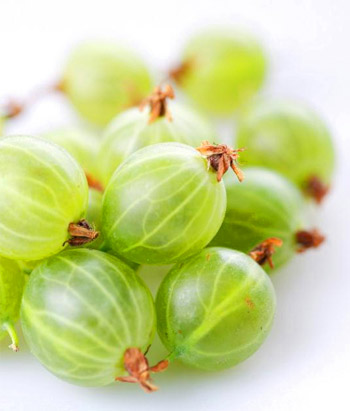|
|
|
 , ,
Font size |
Encyclopedia of Health Benefits of Berries

14. Gooseberries:
These are small round berries whose skin appears striped. These are
green in color during the growing stage and ripe to become deep purple or
yellow in color.
THe health benefits of the Indian Gooseberry or Amla can be attributed to
the high vitamin C content. Amla enhances food absorption, balances stomach
acid, fortifies the liver, nourishes the brain and mental functioning,
supports the heart, strengthens the lungs, regulates elimination, enhances
fertility, helps the urinary system, is good for the skin, promotes
healthier hair, acts as a body coolant, flushes out toxins, increases
vitality, strengthens the eyes, improves muscle tone and it acts as an
antioxidant.
The Indian Gooseberry belongs to the Euphorbiaceae family. This fruit is
ripe in autumn season in wet forest of hill areas in Indian subcontinent. In
India it is considered as a sacred tree. The fruit is very nourishing. It
tastes sour. Both dried and fresh fruits can be used.
It provides remedies for many diseases so it is widely used in ayurvedic
medicines. Gooseberry is very rich in Vitamin C. It contains many minerals
and vitamins like Calcium, Phosphorus, Iron, Carotene and Vitamin B Complex.
Amla is also a powerful antioxidant agent. Many health problems are conduced
by oxidative damage (when body cells use oxygen they produce by-products
that can cause damage). Antioxidant agents prevent and repair such damages.
Vitamin C is a good antioxidant agent and so is Gooseberry.
The health benefits of amla include the following:
Hair care Amla is used in many hair tonics. It enriches hair growth and hair
pigmentation. It strengthens roots of hair , maintains color and luster.
Eating fresh fruit or applying its paste on hair roots improves hair growth
and color. Amla oil is very popular in India as it serves as a very good
hair growth booster thereby preventing hair loos.
 Eye care: Taking Gooseberry juice with honey is good for improving eyesight.
It improves nearsightedness and cataract. It reduces intraocular tension. Eye care: Taking Gooseberry juice with honey is good for improving eyesight.
It improves nearsightedness and cataract. It reduces intraocular tension.
Diabetes: Gooseberry contains chromium. It has a therapeutic value in
diabetics. Indian Gooseberry or Amla stimulate the isolated group of cells
that secrete the hormone insulin.
Thus it reduces blood sugar in diabetic patient.
Heart disease: Gooseberry strengthens heart muscles. So heart pumps blood
flawless throughout the body.
Infection: Due t o its antibacterial and astringent attributes the Indian
Gooseberry protects against infection. It improves body resistance.
Diarrhea and dysentery: Due to its strong, cooling and laxative properties
Gooseberry is useful for remedies for diarrhea and dysentery. It is a great
relief for gastric syndrome and hyperchlorhydria (burning sensation in
abdomen).
Improving appetite: Consuming Gooseberry powder with butter and honey before
meal improves appetite. It helps in balancing Nitrogen level and thus
increases weight in a healthy way.
Anti aging: Amla prevents health related hyperlipidaemia through attenuating
oxidative stress in the ageing process.
The fresh fruit contains more than 80% water, protein, minerals,
carbohydrates and fiber. It is also used as remedies for fever, liver
disorder, indigestion, anemia, urinary problems, respiratory problems,
cerebral, gastro and cardiovascular illness. Gooseberry lowers cholesterol
level. It increases red blood cell production and strengthens teeth and
nails. So the Indian gooseberry or Amla as a fresh fruit or juice or in
dried form is much good for your health.
Next..
Dated 12 March 2013

|
|
|
|
|
|
|









